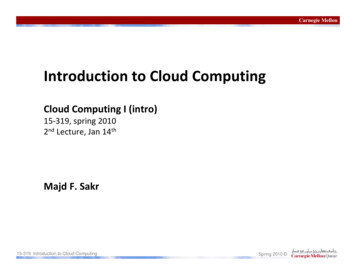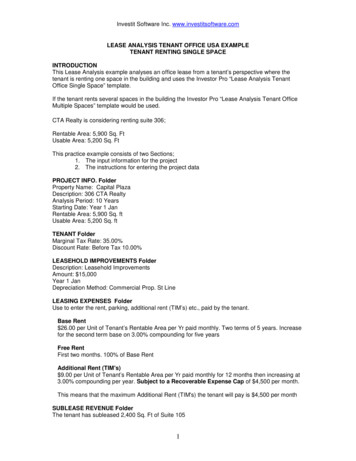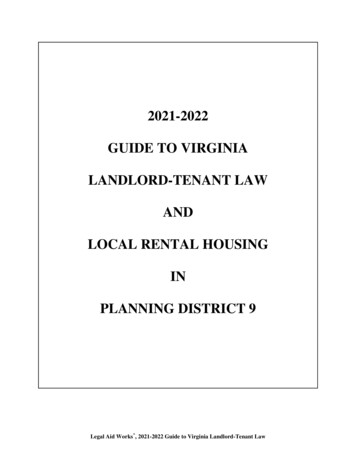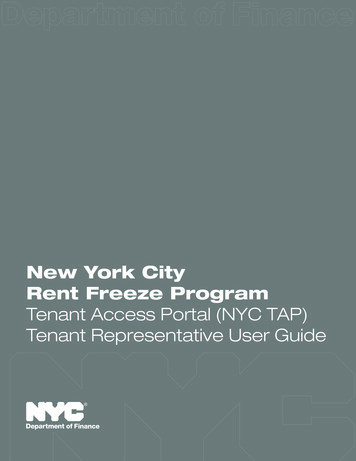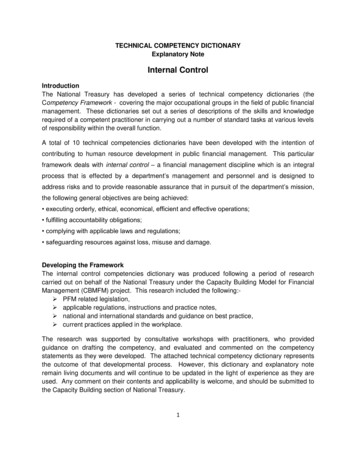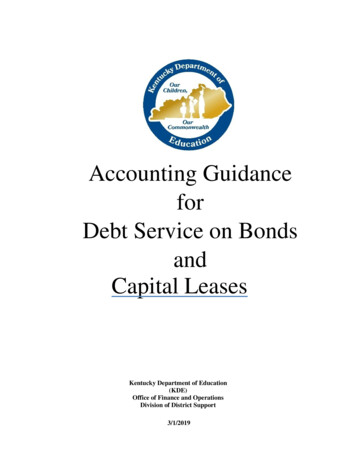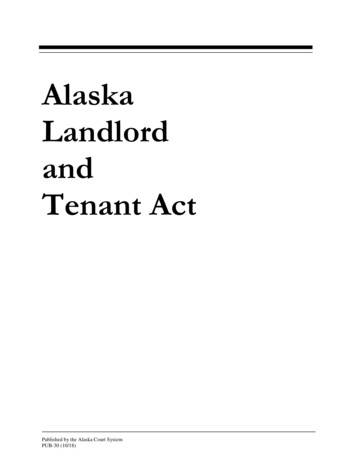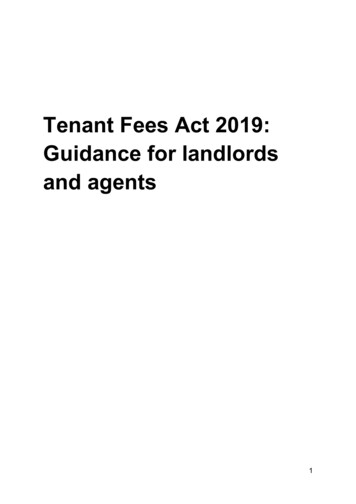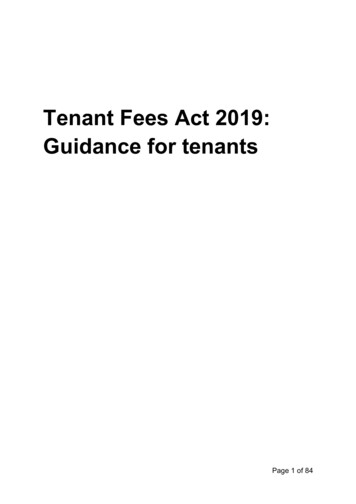
Transcription
Tenant Fees Act 2019:Guidance for tenantsPage 1 of 84
ContentsABOUT THE BAN .4The law on tenant fees is changing. Do you know what fees a landlord oragent can ask you to pay? . 4When does the ban apply? . 5Does the ban apply to me?. 5ENFORCEMENT . 6Q. What is considered to be a breach of the ban? . 6Q. Who will carry out enforcement of the ban?. 6Q. Who are Trading Standards?. 6Q. Are there any other enforcement options?. 6Q. What is a redress scheme and how do I find out which one my agentbelongs to? . 7The Tenant Fees Act extends the requirement to display fees to cover onlineproperty websites that advertise properties to let on behalf of letting agents. . 7Q. Will I be charged for making a claim to the local authority, First-tier Tribunalor redress scheme?. 7Q. What evidence will I need to support my claim at the Tribunal? . 7Q. What is a Lead Enforcement Authority? . 8Q. Why am I not entitled to compensation under the ban? . 8What should I do if a landlord or agent has charged a prohibited payment?. 9What should I do if I think that a landlord or agent has retained my holdingdeposit unlawfully?. 11. 14What should I do if a landlord or agent has charged a default fee ordamages payment unlawfully? . 15Where can I get more information about letting a property in England? . 21ANNEX A – TENANT FEES ACT Q&A .22What type of tenancy do I have? . 27PROHIBITED PAYMENTS . 28What payments are not permitted under the ban?. 28VIEWING FEES . 28TENANCY SET-UP FEES . 28TENANCY CHECK-OUT FEES . 30THIRD PARTY FEES . 32PERMITTED PAYMENTS . 35Page 2 of 84
What payments are permitted under the ban? . 35RENT . 35TENANCY DEPOSITS . 37DEPOSIT OPTIONS . 41HOLDING DEPOSITS . 43DEFAULT FEES AND DAMAGES . 59CHANGES TO A TENANCY . 69EARLY TERMINATION FEES . 71OTHER PAYMENTS . 73EXCLUDED LICENCES TO OCCUPY (HOMESHARE ORGANISATIONS) . 75COVID-19 IMPACT ON THE TENANT FEES ACT . 76ANNEX B – DRAFT LETTERS TO LANDLORDS AND AGENTS .79Page 3 of 84
ABOUT THE BANPlease note: this guidance applies to England only.The law on tenant fees is changing. Do you knowwhat fees a landlord or agent can ask you to pay?A landlord or agent cannot require you (or anyone acting on your behalf orguaranteeing your rent) to make certain payments in connection with a tenancy inEngland. They cannot require you to enter a contract with a third party for theprovision for a service or for insurance or make a loan in connection with a tenancy.The only payments in connection with a tenancy that you can be asked tomake are: the renta refundable tenancy deposit capped at no more than five weeks’ rent whereyour total annual rent is less than 50,000, or six weeks’ rent where your totalannual rent is 50,000 or abovea refundable holding deposit (to reserve a property) capped at no more thanone week’s rentpayments to change the tenancy when requested by the tenant, capped at 50, or reasonable costs incurred if higherpayments associated with early termination of the tenancy, when requestedby the tenantpayments in respect of utilities, communication services, TV licence andcouncil tax; andA default fee for late payment of rent and replacement of a lost key/securitydevice giving access to the housing, where required under a tenancyagreement.If the payment a landlord or agent is charging is not on this list it is not lawful, and alandlord or agent should not ask you to pay it. If a landlord or agent has charged aprohibited payment you should follow the steps on page 10.A landlord cannot evict you using the section 21 eviction procedure until theyhave repaid any unlawfully charged fees or returned an unlawfully retainedholding deposit. All other rules around the application of the section 21evictions procedure will continue to apply.Page 4 of 84
When does the ban apply?It depends on when you entered into a tenancy agreement. The ban is beingintroduced in two stages.As of 1 June 2020, the ban applies to all applicable tenancies, student lets or licenceto occupy housing in the private rented sector regardless of when they were enteredinto. Landlords will be responsible for the costs associated with setting up, renewingor ending a tenancy (e.g. referencing, administration, inventory, renewal and checkout fees). You should challenge a landlord or agent if you think they are charging anunlawful fee.If you entered into a tenancy before 1 June 2019, a landlord or agent was still ableto charge fees up until 31 May 2020, but only where these are required under anexisting tenancy agreement. Since 1 June 2020, the term requiring that payment isno longer binding. Should you, in error, make such a payment, you should ask thelandlord or agent to return the payment immediately. The payment must be returnedwithin 28 days. If they do not return the payment within 28 days, then they will betreated for the purposes of the Act as having required you to make a prohibitedpayment (a payment that is outlawed under the ban).Does the ban apply to me?The ban applies to all assured shorthold tenancies, tenancies of studentaccommodation and licences to occupy housing in the private rented sector inEngland. Most tenancies in the private rented sector are assured shortholdtenancies.In this guidance ‘tenant’ includes licensees. ‘Relevant persons’ are any personsacting on behalf of a tenant or licensee or guaranteeing the rentYou can use this tenancy checker to find out which tenancy you have.Please note: certain licences to occupy are excluded from the Tenant Fees Act2019, such as those granted under Homeshare arrangements (provided that thenecessary conditions apply).Local housing authorities, the Greater London Authority or a person or organisationacting on their behalf are excluded from the definition of relevant person under theAct and can continue to make payments in connection with a tenancy when actingon behalf of a tenant or guaranteeing their rent.Page 5 of 84
ENFORCEMENTQ. What is considered to be a breach of the ban?Each request a landlord makes for a prohibited payment is a breach. For example,the following would be considered multiple breaches: charging different tenants under different tenancy agreements prohibited feescharging one tenant multiple prohibited fees for different services at differenttimescharging one tenant multiple prohibited fees for different services at the sametimecharging one tenant one total prohibited fee which is made up of differentseparate prohibited requirements to make a payment e.g. 200 requested forarranging the tenancy and doing a reference check multiple breaches.Where a landlord or agent is being fined for multiple breaches at once, and theyhave not previously been served a financial penalty, the financial penalty for each ofthese breaches is limited to up to 5,000 each.Q. Who will carry out enforcement of the ban?Trading standards authorities have a duty to enforce the ban but district councils thatare not Trading Standards authorities may also enforce if they choose to do so. Youcan find your local trading standards authority here.Q. Who are Trading Standards?Trading Standards are based within local authorities and enforce consumer rights.They can determine whether a tenant or relevant person has been charged anunlawful or unfair payment by a landlord or agent and issue a financial penalty for abreach of the ban, if this has been established.Q. Are there any other enforcement options?The Act also makes provision for tenants or relevant persons to be able to recoverunlawfully charged fees through the First-tier Tribunal, and, importantly, preventslandlords from recovering possession of their property via the section 21 evictionprocedure until they have repaid any unlawfully charged fees or unlawfully retainedholding deposit.Your local authority may assist you with claims to the First-tier Tribunal, and it maybe useful to speak with Citizens Advice or a lawyer before you apply. If necessary,your local authority may also be able to support you with an application to the countycourt to enforce an order of the First-tier Tribunal. If the issue is regarding a lettingagent, you can apply to the relevant redress scheme.Page 6 of 84
Q. What is a redress scheme and how do I find out which one my agentbelongs to?A redress scheme is an impartial complaints resolution service which allows tenantsand landlords to raise complaints against their letting agent where the agent has notsatisfactorily resolved that complaint previously.According to the Consumer Rights Act 2015, every letting agent must belong to aGovernment-approved redress scheme. There are two redress schemes: The Property Redress SchemeThe Property OmbudsmanLetting agents must display the name of the scheme they belong to in their officesand on their website. You can also have a look at either scheme’s online checkingtool to find out whether an agent is a member: eprs.co.uk/consumer/members/If your agent does not belong to a Government-approved redress scheme, youshould contact Citizens Advice. Agents that are not a member of a scheme can facea financial penalty of up to 5,000.The Tenant Fees Act extends the requirement to display fees to cover onlineproperty websites that advertise properties to let on behalf of letting agents.Q. Will I be charged for making a claim to the local authority, First-tier Tribunalor redress scheme?Your local authority, redress scheme or the charity Citizens Advice should notcharge for their service. You should consider seeking independent advice beforemaking a claim for the repayment of a prohibited payment.If you wish to apply to the First-tier Tribunal for a repayment of a prohibited payment,you may have to pay a small fee. You can apply for help paying the fee if you’re oncertain benefits or a low income. The local authority may also assist you with claimsto the First-tier Tribunal.Q. What evidence will I need to support my claim at the Tribunal?You should keep any evidence that proves a landlord or agent has requested apayment or any evidence to demonstrate that you have paid an unlawful charge; thiscould be: tenancy or pre-tenancy agreements any other relevant paperwork receipts and invoices bank statementsPage 7 of 84
correspondence from the landlord or agent – emails, letters, text messagesnotes that you made during or shortly after any conversation with a landlord oragentIf your landlord or agent asks you to make a prohibited payment, you shouldrefuse. If your landlord or agent insists on the payment, you should get evidence ofthis in writing. You should ensure that you keep a record of any correspondence withthe landlord or agent.Q. What is a Lead Enforcement Authority?The Secretary of State (i.e. the Government) can arrange for a lead enforcementauthority whose duty it is to oversee the operation of the tenant fees ban and anyother relevant letting agency legislation. The Secretary of State may themselves actas lead enforcement authority. The lead enforcement authority is the NationalTrading Standards Estate and Letting Agency Team.Q. Why am I not entitled to compensation under the ban?You are entitled to be repaid the sum of any unlawfully charged fees, an unlawfullyretained holding deposit or amounts paid under a prohibited contract as well as anyinterest owed. A landlord or agent will be liable for financial penalty of up to 5,000for an initial breach of the ban. If they breach the ban again, they will be liable for afinancial penalty of up to 30,000 or prosecution.Page 8 of 84
What should I do if a landlord or agent has chargeda prohibited payment?1. Check the list of permitted payments within this guidance document – if you arestill unsure you could seek independent assistance from a charity like CitizensAdvice.2. Use the draft letter/email in Annex B to ask your landlord or agent to return thepayment immediately.3. If a letting agent has charged an unlawful payment and they are refusing toreturn this, you could complain to the relevant redress scheme.All letting agents must belong to a Government-approved redress scheme. Thisinformation should be clearly available on the agent’s website. If this is notavailable, you should ask your letting agent which redress scheme they belongto. Redress schemes offer an independent dispute resolution service betweentenants/landlords and agents – they do not charge for their service.4. Contact your local authority if your landlord or agent still does not return thepayment.Local authorities (usually trading standards) are responsible enforcing the ban.They can take formal enforcement action against the landlord or agent andrequire them to repay any fee that has been unlawfully charged. They may alsorequire the landlord or agent to pay interest on this amount.5. You could recover the payment directly via the First-tier Tribunal.The First-tier Tribunal is easy to access for tenants and relevant persons. You willbe required to submit evidence to support any application you make (examples ofevidence that you could provide are included below). The First-tier Tribunal canorder a landlord or agent to repay a payment which has been charged unlawfully.The local authority may be able to assist with this process. You may have to paya small fee to make a claim to the First-tier Tribunal. You will not be eligible forlegal aid but may be eligible for other financial support to help pay any Tribunalfees.Page 9 of 84
You should keep any evidence that demonstrates:o you have been asked to pay an unlawful fee (i.e. emails or letters from thelandlord or agent/notes from verbal conversations)o you have paid an unlawful fee (i.e. written confirmation from the landlord oragent, receipts, invoices, bank statements)Need help? You can seek free advice and support through Citizens Advice, or from yourlocal authority (usually trading standards).Page 10 of 84
What should I do if I think that a landlord or agenthas retained my holding deposit unlawfully?1. Check the list of permitted payments within this guidance document – if you arestill unsure you could seek independent assistance from a charity like CitizensAdvice.2. Use the draft letter/email in Annex B to ask your landlord or agent to returnyour holding deposit within 7 days if you think they have retained it unlawfully.3. If a letting agent is refusing to return your holding deposit, you could complain tothe relevant redress scheme.All letting agents must belong to a Government-approved redress scheme. Thisinformation should be clearly available on the agent’s website. If this is notavailable, you should ask your letting agent which redress scheme they belongto. Redress schemes offer an independent dispute resolution service betweentenants/landlords and agents and do not charge for their service.4. Contact your local authority if your landlord or agent still does not return yourholding deposit.Local authorities (usually trading standards) are responsible for enforcing theban. They can take formal enforcement action against the landlord or agent anddetermine whether they have retained your holding deposit unlawfully.5. You could recover your holding deposit directly via the First-tier Tribunal.The First-tier Tribunal is easy to access for tenants and relevant persons. You willbe required to submit evidence to support any application you make (examples ofevidence that you could provide are included below). The First-tier Tribunal canorder a landlord or agent to repay your holding deposit. The local authority maybe able to assist with this process. You may have to pay a small fee to make aclaim to the First-tier Tribunal. You will not be eligible for legal aid but may beeligible for other financial support to help pay Tribunal fees.Page 11 of 84
What do I need to know about holding deposits? A holding deposit is a refundable payment which demonstrates yourcommitment to rent a property whilst referencing checks take place. A landlord or agent cannot ask you for a holding deposit which is more thanone week of the total rent for the property. A landlord or agent can only accept one holding deposit at any one time 1. A landlord or agent should provide clear information in advance about theholding deposit and the circumstances under which you may lose the deposit. A landlord or agent should make you aware of the suitability requirementsbefore taking a holding deposit from you (i.e. basic income and creditworthiness requirements for the property). Once you have paid a holding deposit, landlords and agents will usually havetwo weeks (14 days) to enter into an agreement with you before ‘deadline foragreement’, which is the 15th day after the landlord or agent has received thedeposit (unless agreed otherwise with you writing). A holding deposit can only be retained where a tenant:o provides false or misleading information which it is reasonable for alandlord or agent to take into account (this can include the tenantsaction in providing it) in deciding whether to grant the tenancy (e.g.affects their suitability as a tenant)o fails a Right to Rent checko withdraws from a property*o fails to take all reasonable steps to enter into a tenancy agreementwhen a landlord or agent has done so**this does not apply where a landlord or agent imposes a requirement thatbreaches the ban (e.g. requiring you to pay an unlawful fee) and/or acts insuch a way that it would be unreasonable to expect you to enter into atenancy agreement with them (e.g. including unfair terms in a tenancyagreement or acting in a harassing or aggressive way) A landlord or agent is required to return the holding deposit or set out inwriting their reason for retaining the deposit within 7 days of deciding not toenter the agreement if the ‘deadline for agreement’ has not passed or within7 days of the ‘deadline for agreement’ if it has. Where applicable, landlords and agents should consider on a case-by-casebasis whether they need to retain your holding deposit and the appropriateamount to retain.Unless a landlord or agent has lawful grounds to retain an existing holding deposit in accordancewith the Tenant Fees Act.1Page 12 of 84
Questions to ask: Has the landlord or agent asked for a holding deposit which is more than oneweek’s rent? Has the landlord accepted multiple holding deposits for the same property?If the landlord has not returned your holding deposit: Does the landlord or agent have legitimate grounds to retain your holdingdeposit? Has the landlord or agent set out the reason for retaining your deposit inwriting? Has the landlord or agent imposed a requirement which breaches the ban oracted in such a way that it would be unreasonable to expect you to enter intoa tenancy agreement with them e.g. a landlord or agent asks you to a pay aprohibited payment, such as a fee for referencing, seeks to include an unfairterm in your tenancy agreement or acts in an aggressive or harassingmanner?You should keep any evidence that demonstrates:o you were asked to pay a holding deposit (i.e. emails or letters from thelandlord or agent/notes from verbal conversations)o you paid a holding deposit (i.e. written confirmation from the landlord or agent,receipts, invoices, bank statements)o you responded to reasonable requests for information from the landlord oragent in respect of your tenancy application (i.e. your address history, contactdetails for a former landlord, employer details)o you asked a landlord or agent to return your holding deposit or to provide alegitimate reason for retaining the deposit (i.e. emails or letters to thelandlord/agent)Need help? You can seek advice and support through Citizens Advice, your local authority(usually trading standards), or the Lead Enforcement Authority. Follow the flowchart below for step-by-step assistance in recovering yourholding deposit.Page 13 of 84
A diagram showing the process of assessing the lawfulness of handling a holding depositQ1: Did the landlord or agent ask you to pay a holding deposit above one week’s rent for the property?No: Proceed to Q2.Yes: The excess is a prohibited payment. You shouldask your landlord or agent to return the excessamount. Return to the start for remaining depositamount.Q2: Did you enter into a tenancy agreement with the landlord?Yes: The landlord or agent must return the holding depositwithin 7 days of entering the agreement.No: Proceed to Q3.Q3: Did the landlord or agent set out the reason for retaining your deposit in writing?Yes: Proceed to Q4.No: The landlord or agent must return theholding deposit within 7 days of entering theQ4: Was the reason given any of the following? You failed a right to rent checkYou withdrew from the proposed agreementYou failed to take all reasonable steps to enter into a tenancy whilst the landlord or agent did (thisdoes not apply if the landlord or agent imposed a requirement that breached the ban and/or acted in sucha way that it would be unreasonable to expect you to enter into a tenancy agreement with them).No: Proceed to Q5.Yes: The landlord or agent can retain your holdingdeposit (a landlord or agent must set out the reason forretaining your deposit within 7 days of deciding not to letthe property to you if the ‘deadline for agreement’ hasnot passed or within 7 days of the ‘deadline foragreement’ passing).Q5: Was the reason given any of the following? You failed a reference check as the landlord considered you unsuitable (but you provided accurateand honest information as required)You failed to reach an agreement in time (and neither the landlord, agent or you were at fault)The landlord or agent withdrew from the proposed agreementYou took all reasonable steps to enter reasonable steps to enter into the tenancy (i.e. respondingto reasonable requests for information required to progress the agreement)Yes: The landlord or agent must return the holdingdeposit within 7 days of entering the agreement.No: Proceed to Q6.Q6: Did you provide false or misleading information that is reasonable for a landlord or agent to take thefalse or misleading information, or your conduct, into account when deciding whether to grant you thetenancy?Yes: The landlord or agent canretain your holding deposit.No: The landlord or agent mustPagereturn14 ofthe84holdingdeposit within 7 days of entering the agreement.
What should I do if a landlord or agent has chargeda default fee or damages payment unlawfully?Default fees1. Check the list of permitted payments within this guidance document – if you areunsure you should seek independent assistance from Citizens Advice.2. Use the draft letter/email in Annex B to ask your landlord or agent to return thefee or demonstrate that the tenancy agreement permits them to charge a defaultfee for:a) a late payment of rent (where the payment has been outstanding for 14days or more, interest can be charged at no more than 3% above the Bankof England’s annual percentage rate for each day it is outstanding); orb) a replacement key/security device giving access to the housing(which must be evidenced in writing to demonstrate the reasonable costsincurred by the landlord or agent)3. If a letting agent has charged an unlawful or unreasonable default fee or isrefusing to provide evidence to support the fee (in the case of a lost key orsecurity device), you could complain to the relevant redress scheme.All letting agents must belong to a Government-approved redress scheme. Thisinformation should be clearly available on the agent’s website. If this is notavailable, you should ask your letting agent which redress scheme they belongto. Redress schemes offer an independent dispute resolution service betweentenants/landlords and agents – they do not charge for their service.4. Where a landlord or agent does not provide suitable evidence in writing to justifythe default fee (in the case of a lost key/security device) or return the fee asappropriate, you can contact your local authority or Citizens Advice to report asuspected breach.Local authorities (usually trading standards) are responsible enforcing the ban.They can take formal enforcement action against the landlord or agent if theyhave charged an unlawful or unreasonable default fee. They may also help you torecover fees through the First-tier Tribunal and then the county court ifnecessary.5. You could challenge or recover the default fee directly via the First-tier Tribunal.The First-tier Tribunal is easy to access for tenants or relevant persons. You willbe required to submit evidence to support any application you make (examples ofevidence that you could provide have been included below). The Tribunal canPage 15 of 84
order a landlord or agent to repay or adjust the level of default fee. The localauthority may be able to assist with this process. You may have to pay a smallfee to make a claim to the First-tier Tribunal. You will not be eligible for legal aidbut may be eligible for other financial support to help pay Tribunal fees.Damages‘Damages’ are the general remedy available for breach of contract and cover anycontractual breach which is not expressly covered by a default provision in thetenancy agreement for late payment of rent or for replacing a lost key/securitydevice.Your landlord or agent can seek to recoup any losses from the tenancy deposit theyhave suffered from the tenancy deposit due to losses arising from the failure of thetenant to perform any of their obligations, or from the failure to discharge any liabilityarising under or in connection with the tenancy. This would include ‘damage’ to theproperty. However, a landlord or agent are also entitled to seek a ‘damages’payment from you at any time, with your agreement or by applying for a court order,for example if the tenancy deposit does not cover the costs they have incurred at theend of the tenancy.1. Firstly, you should challenge the charge: ask the landlord or agent to makeclear why they are seeking ‘damages’ from you and provide evidence of thecosts they have incurred.A payment for ‘damages’ can only be enforced by court order. However, youcan agree to pay ‘damages’ in advance of this if you agree that the costs arefair.You should refuse to pay any damages claims made by landlords or agents ifyou do not agree with them, you think they are unfair or do not understandwhy you are being charged. If you’re unsure, always seek independent advicebefore taking action.2. The payment may breach the ban on fees if it is a default fee which is beingdisguised as damages. For example, landlords and agents cannot write termsinto your tenancy agreement that require a penalty charge should you fail toperform an obligation. Any clause that says ‘if you fail to do x then youmust pay y’ even if the amount is not specified it is likely to be prohibited.If you think the payment breaches the ban, you should contact either CitizensAdvice for support or your local authority (usually Trading Standards), whomay be able to take formal enforcement action against the landlord or agent.Page 16 of 84
3. If you refuse to pay and a landlord or letting agent wishes to recover the claimfor damages before the end of the tenancy, they will need to do this bymaking an application to the courts (or they can recover a legitimate claimthrough you
The Tenant Fees Act extends the requirement to display fees to cover online property websites that advertise properties to let on behalf of letting agents. . 7 . charging different tenants under different tenancy agreements prohibited fees charging one tenant multiple prohibited fees for different services at different
